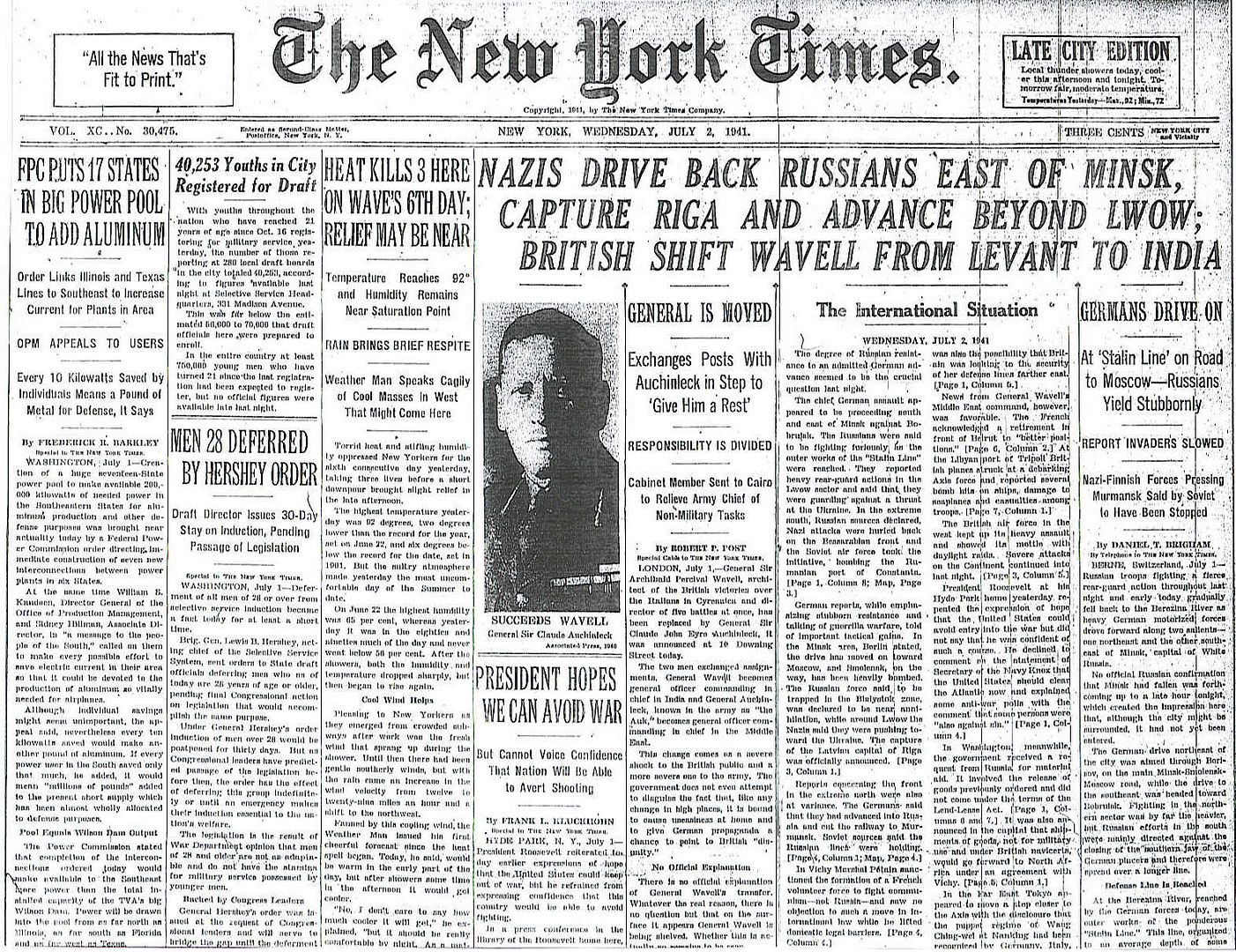
Posted on 07/02/2011 5:02:52 AM PDT by Homer_J_Simpson

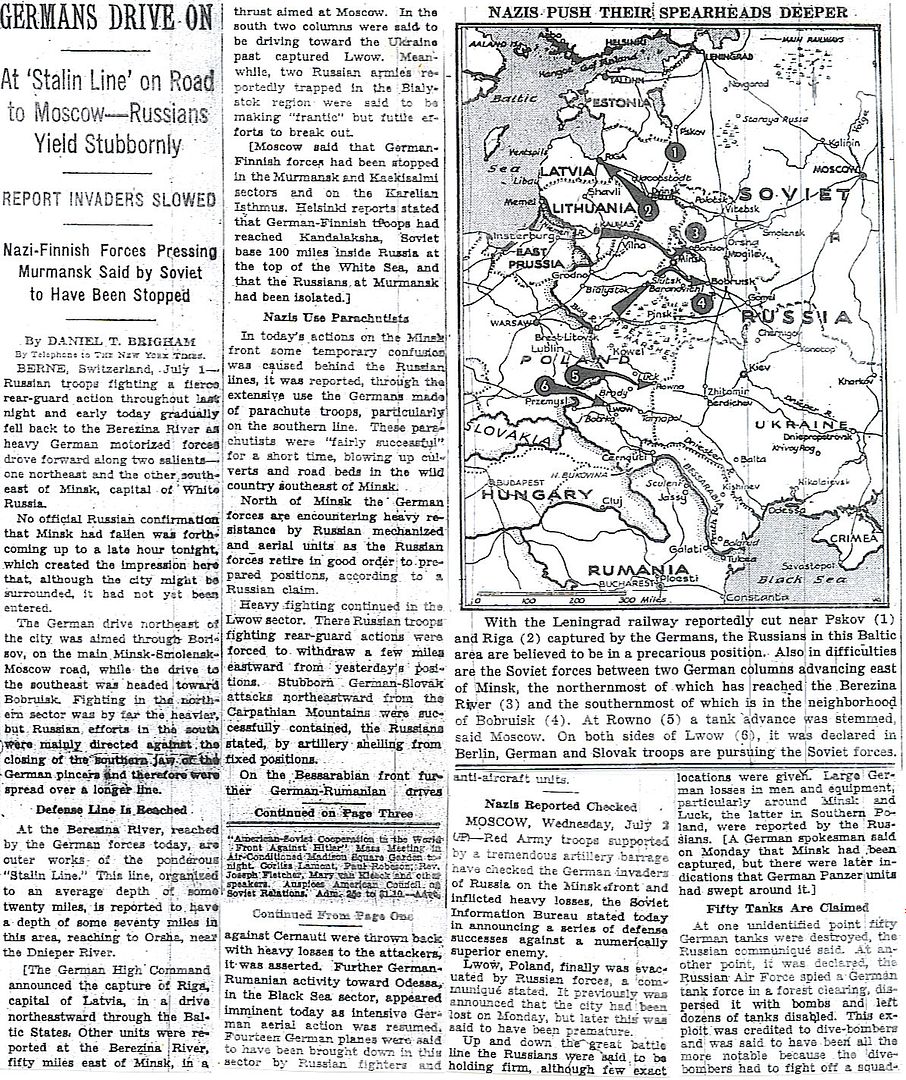
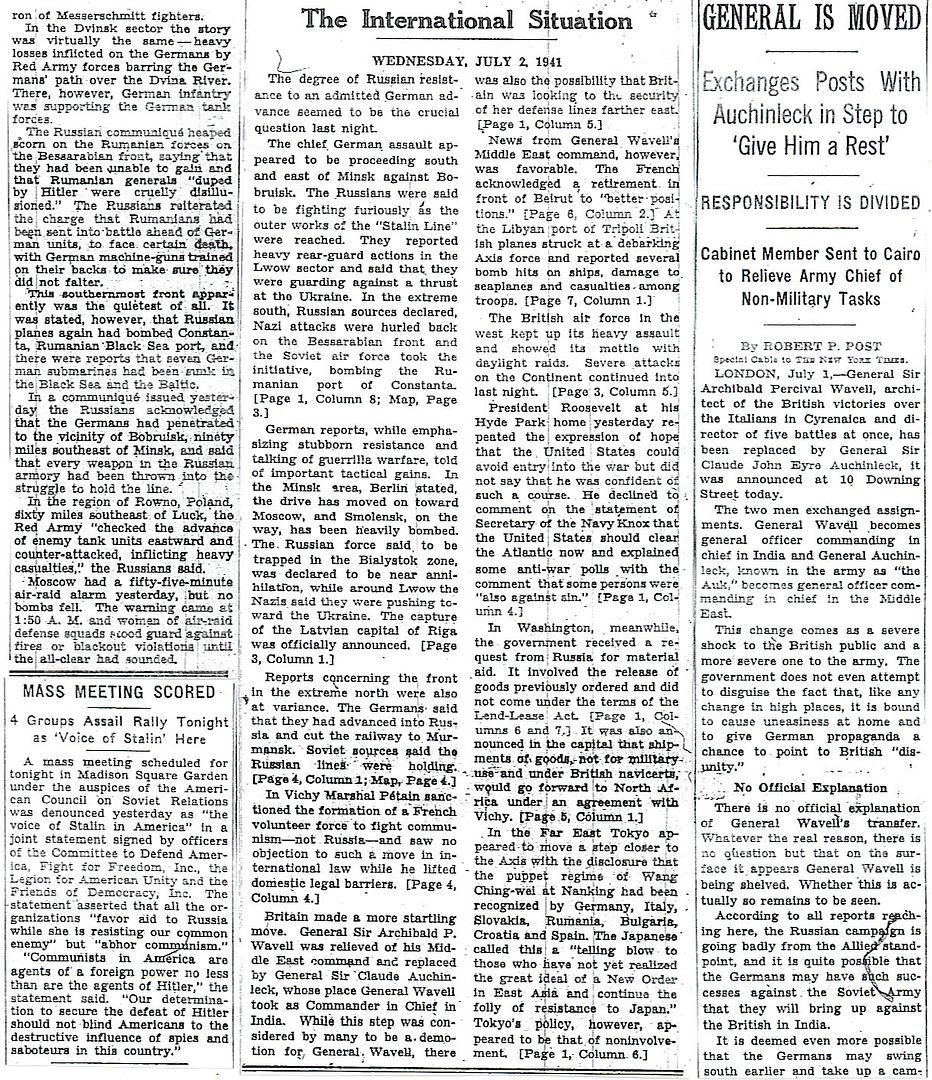
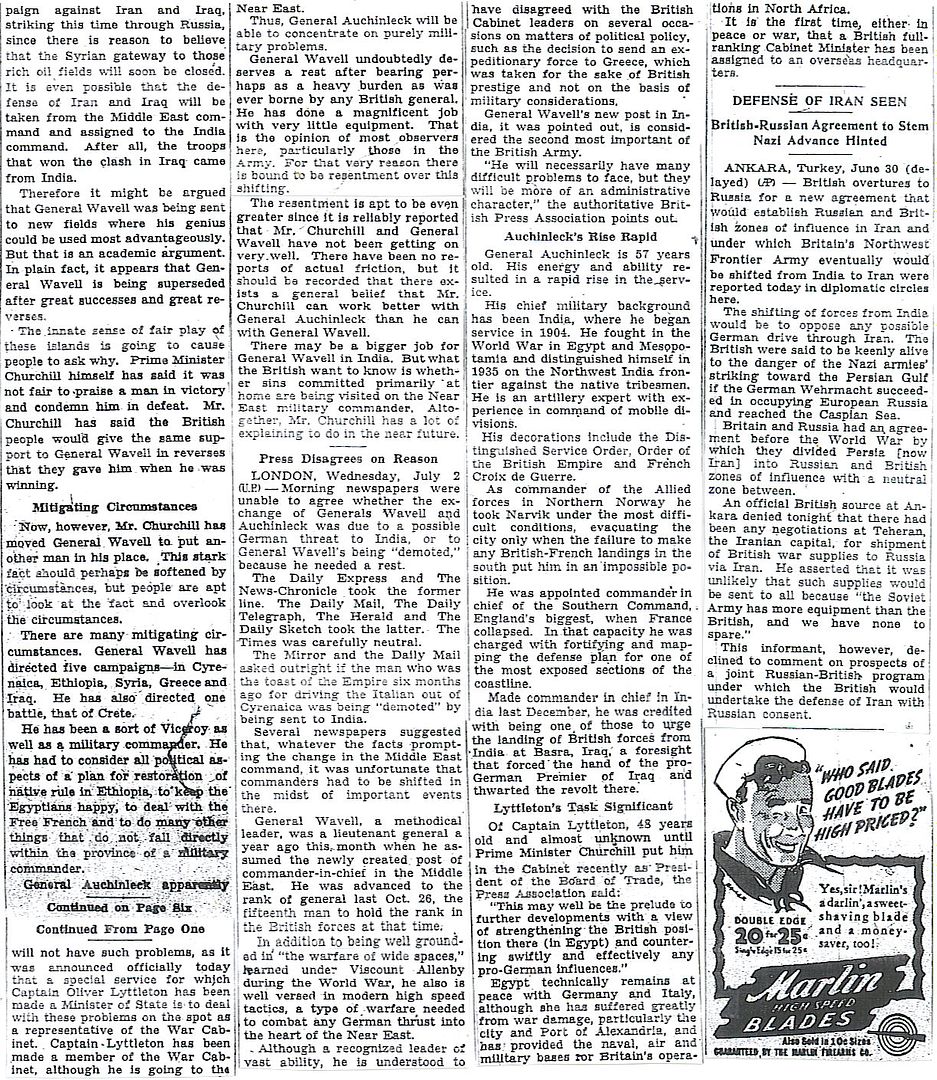
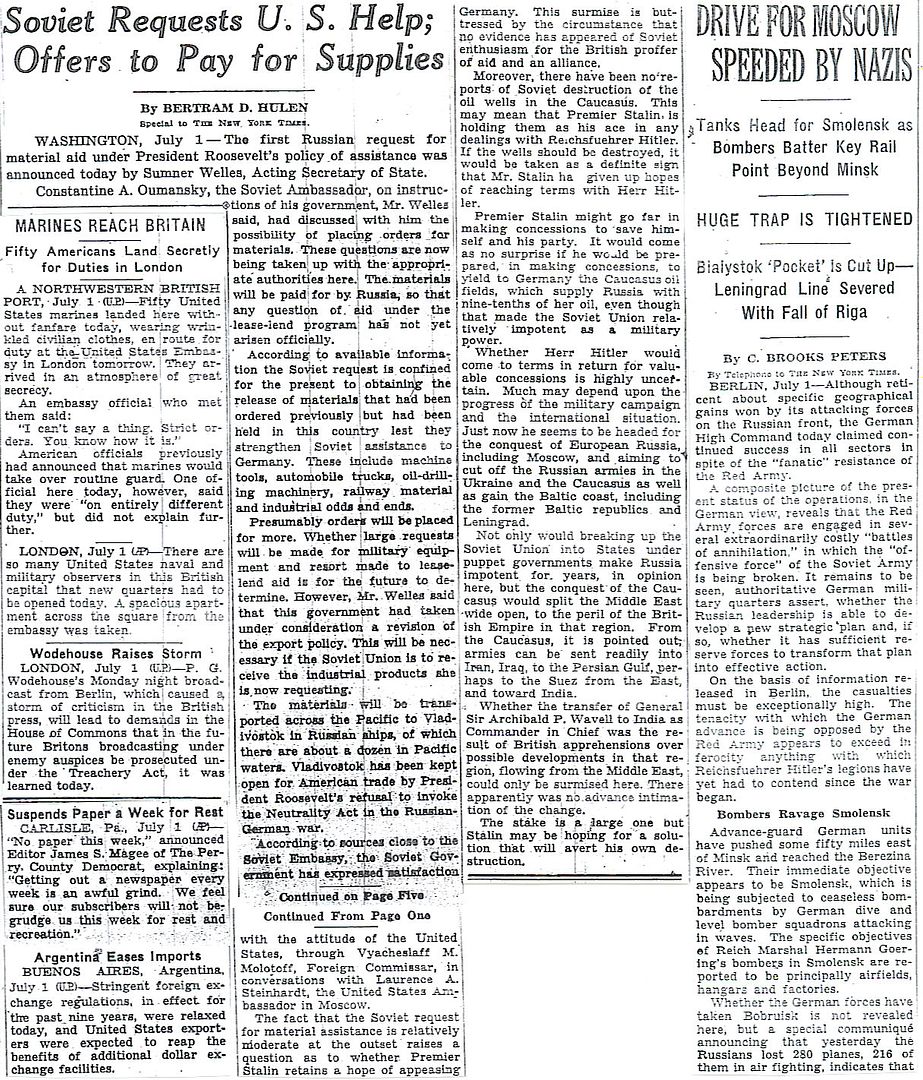
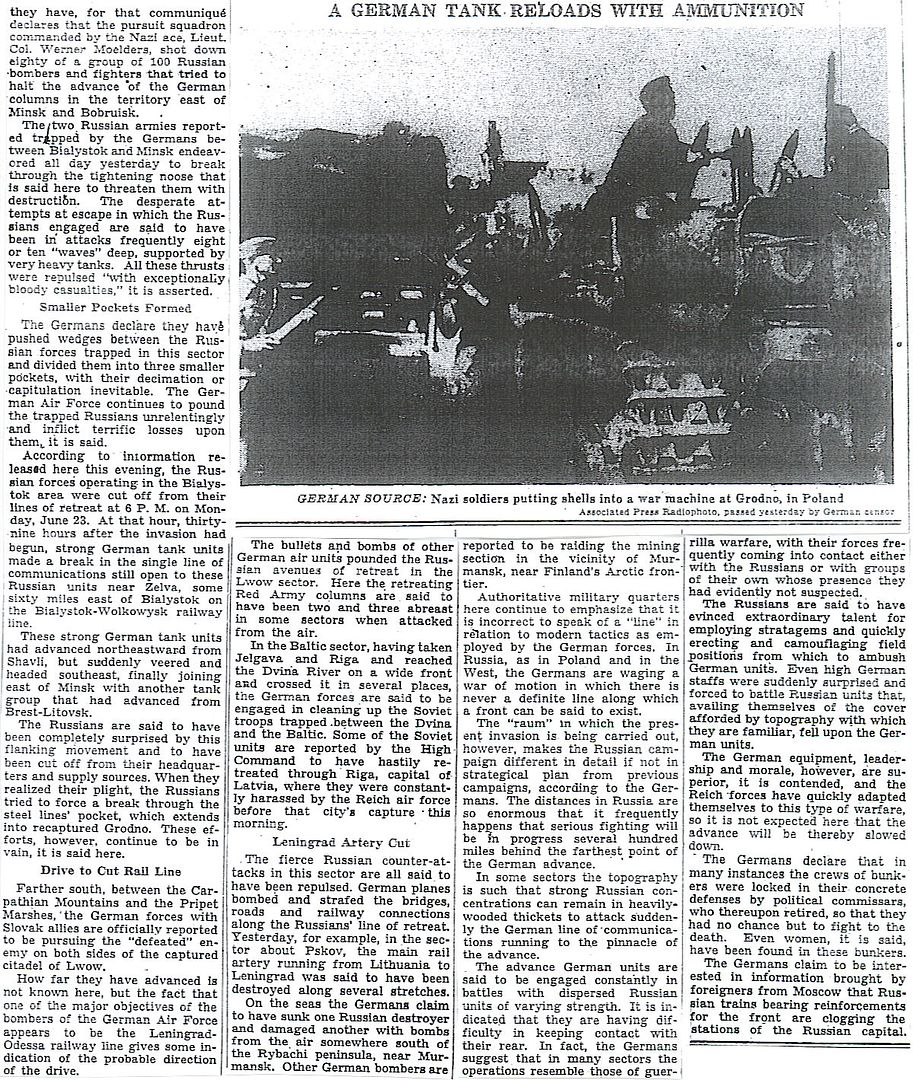
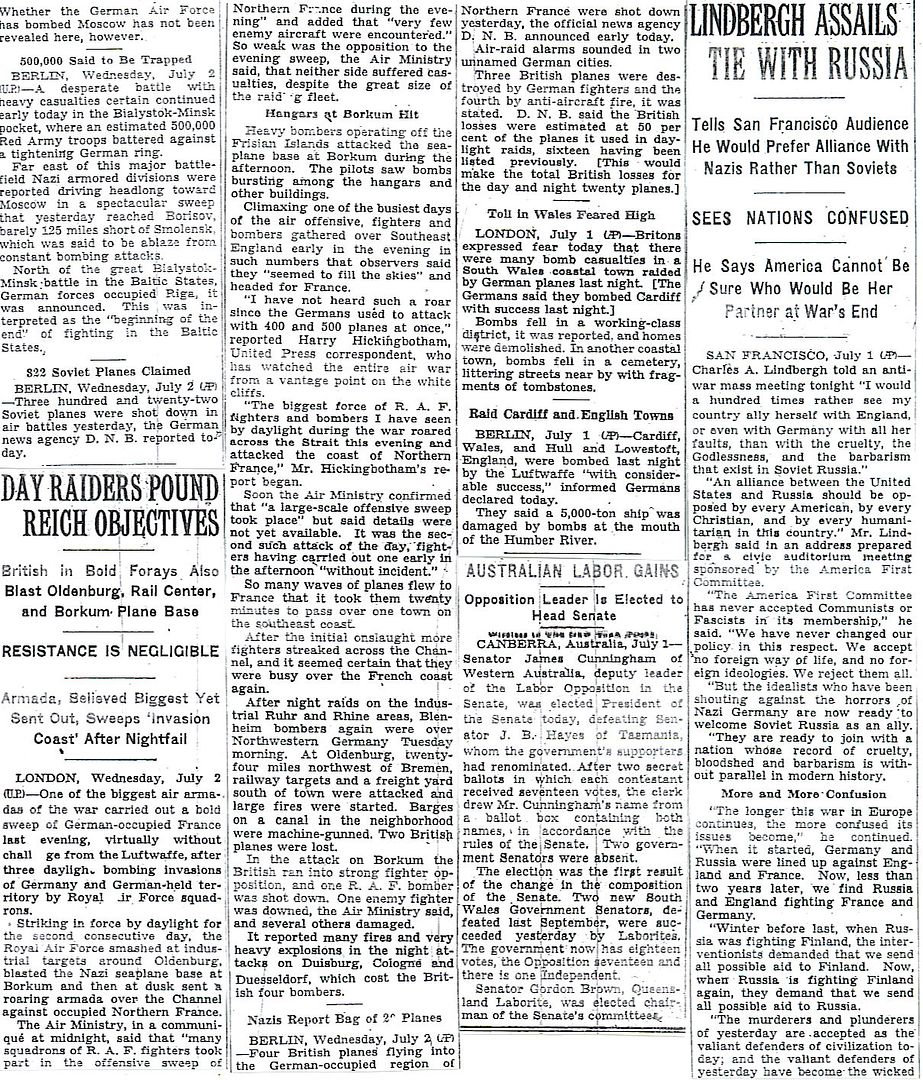
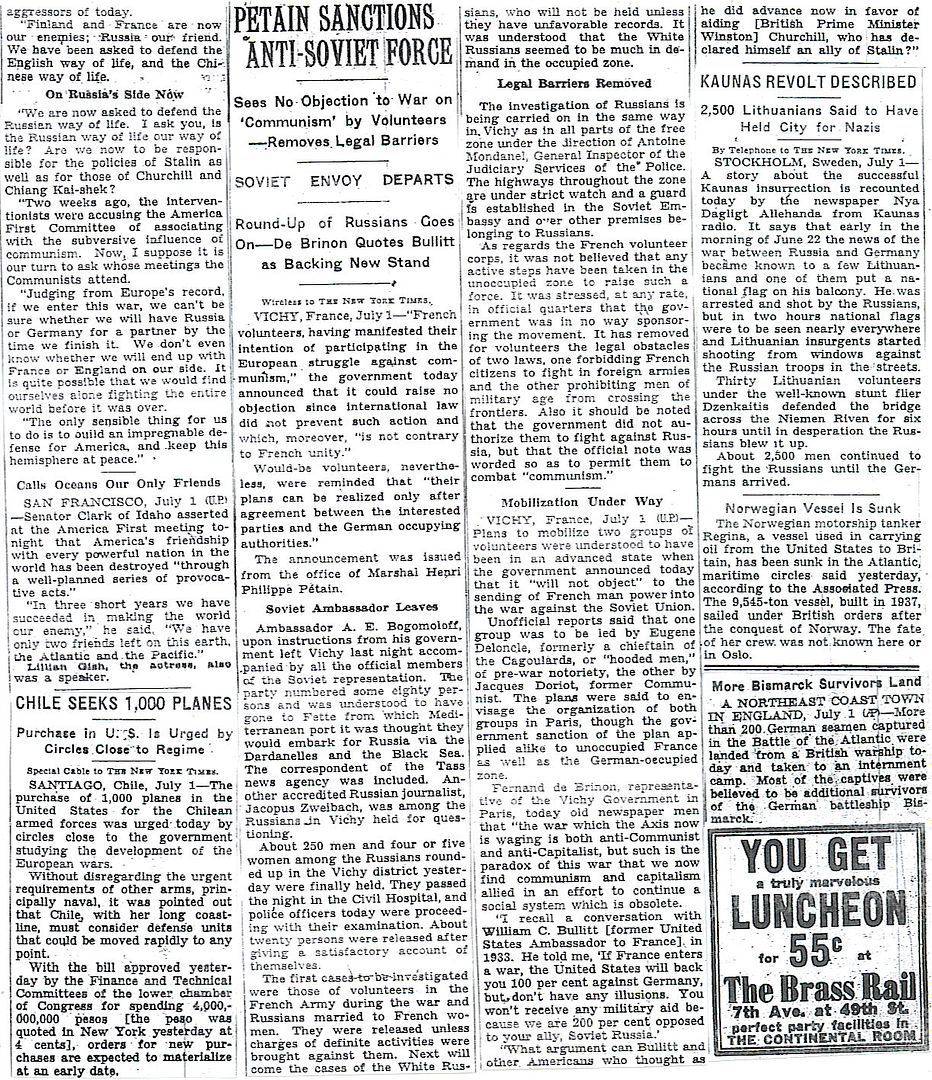
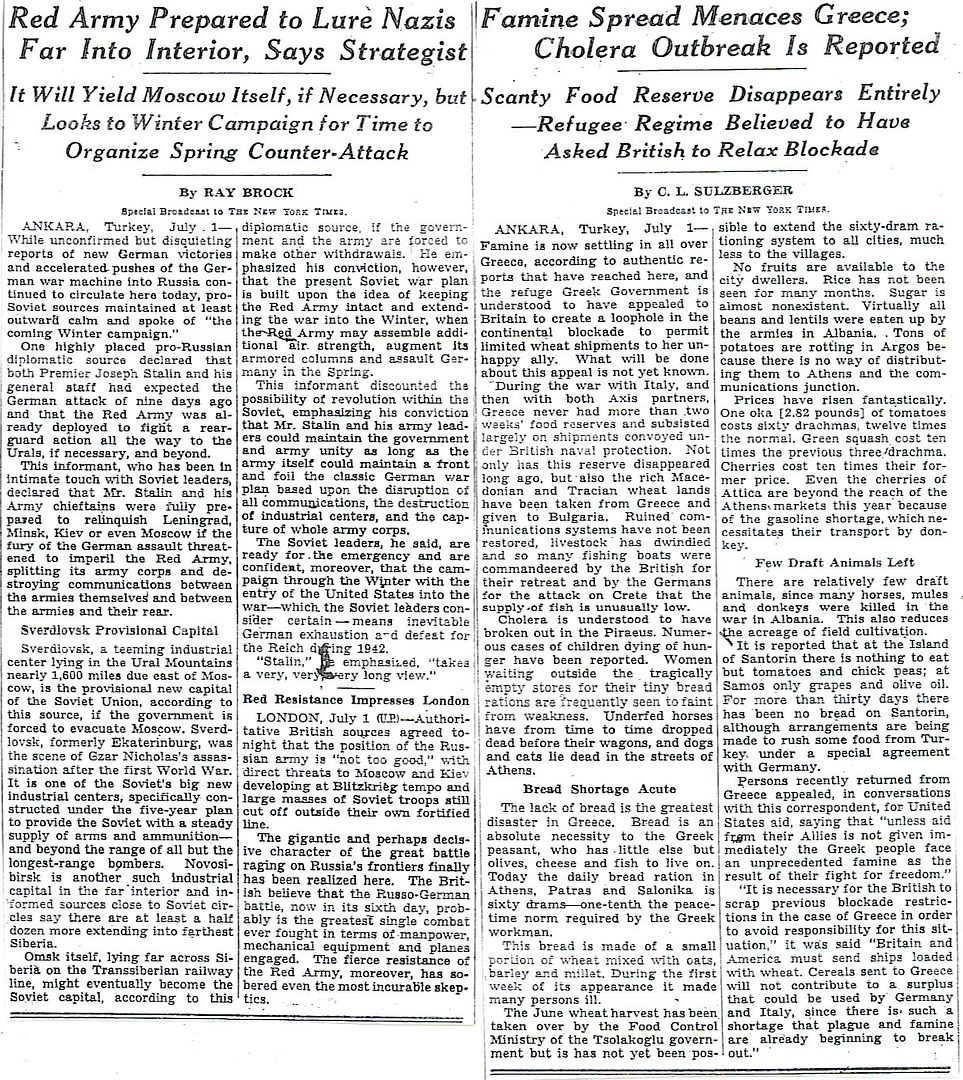
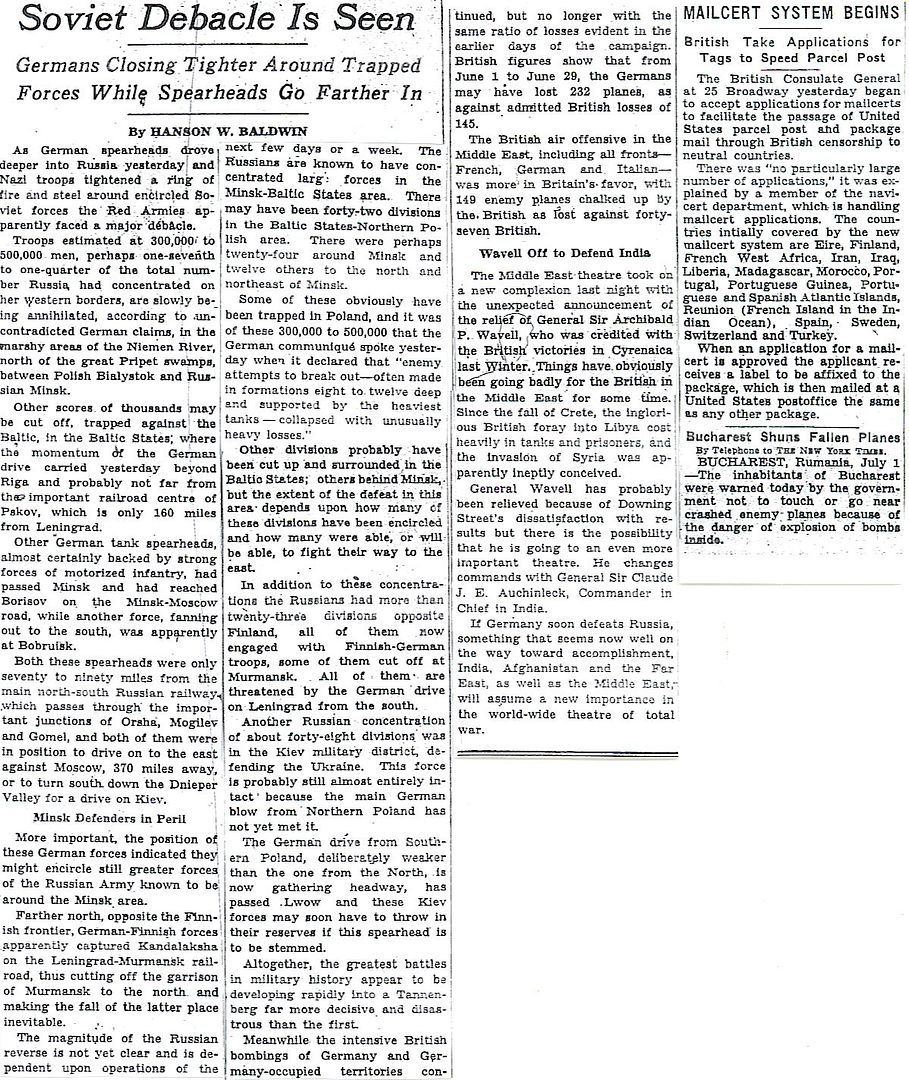
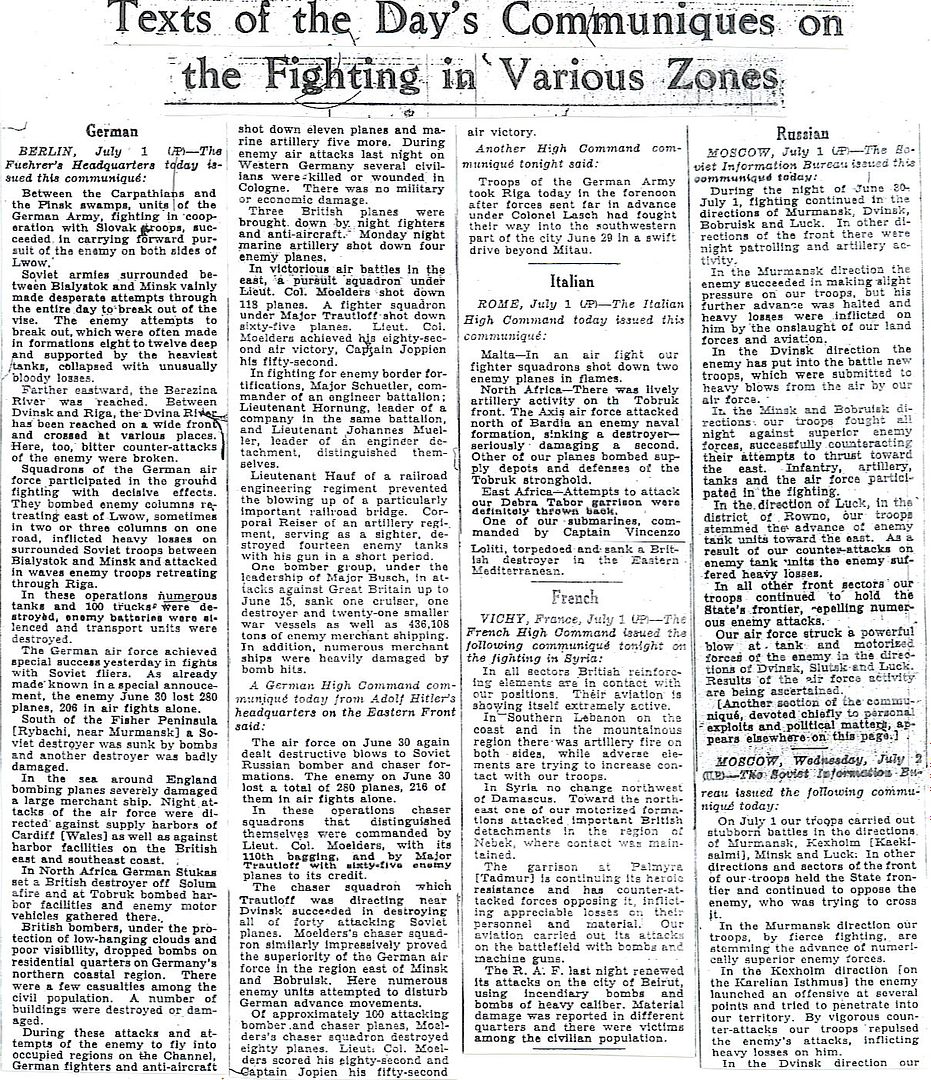
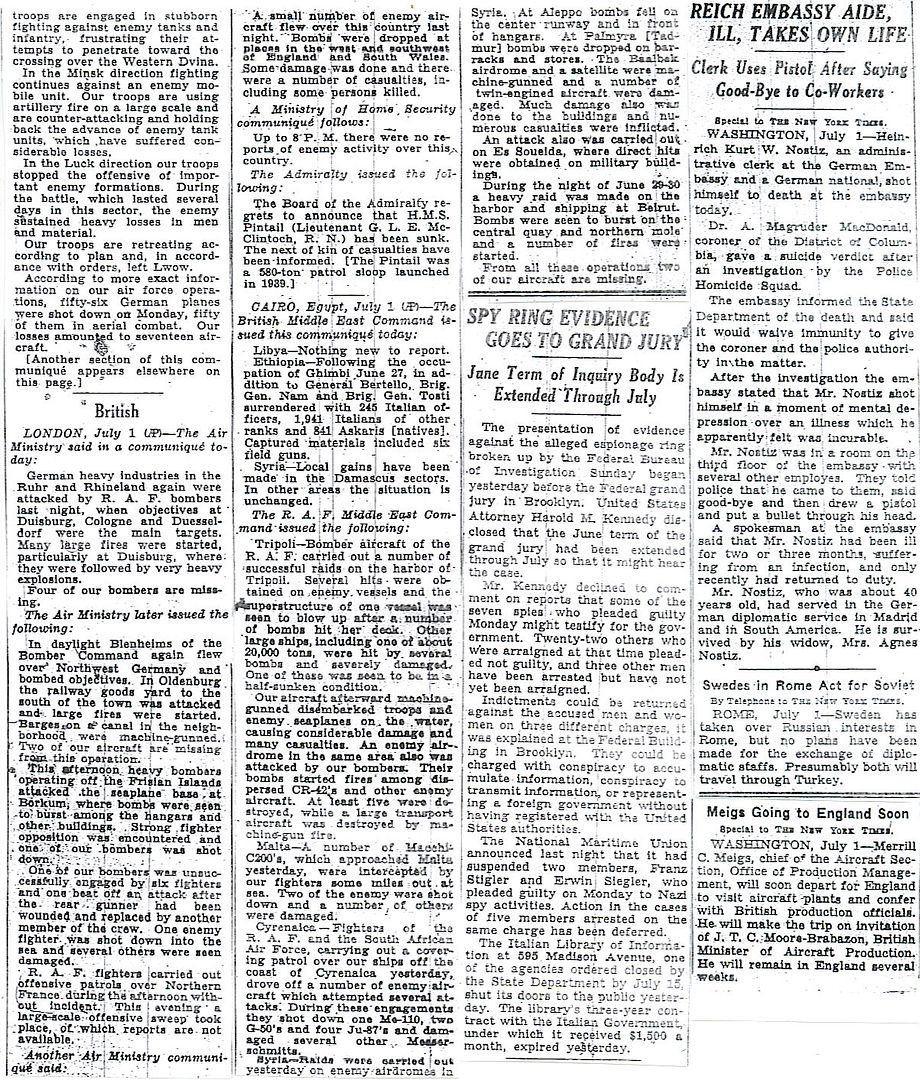
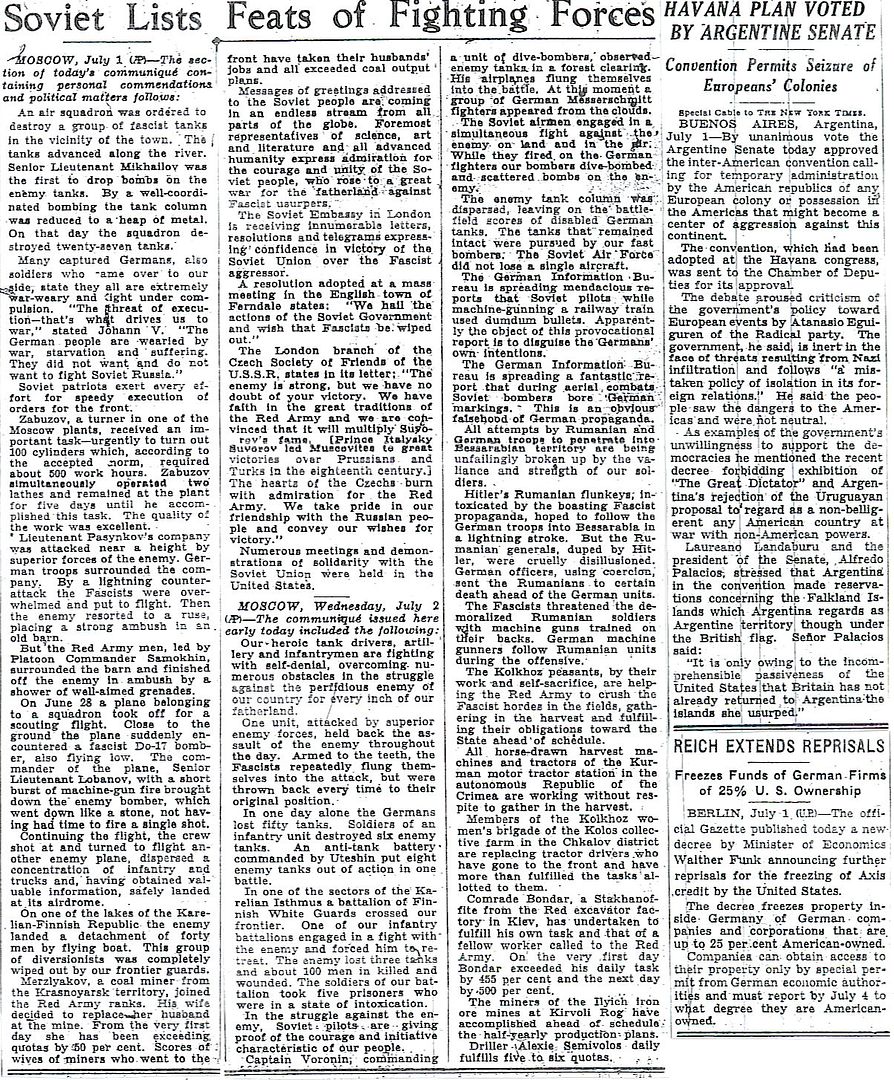
* This or something similar is a new feature running as a supplement to the daily communiqués provided by the Soviets. It appears in the Times every day. It won’t appear here every day.
http://www.onwar.com/chrono/1941/jul41/f02jul41.htm
Japan willing to risk war for bases
Wednesday, July 2, 1941 www.onwar.com
In Tokyo... An Imperial Conference (a meeting of Japanese government and military leaders and the Emperor to explain policy to the Emperor and nominally to take important decisions — in practice these are already taken at the Liaison Conferences between the politicians and the military leaders) records the decision that attempts should be made to take bases in Indochina even at the risk of war.
In the United States... The US authorities very soon know of this determination through their code-breaking service which has managed to work out the key to the major Japanese diplomatic code and some other minor operational codes. The information gained from the diplomatic code is circulated under the code name Magic.
On the Eastern Front... After a rapid concentration and regrouping Hoeppner’s Panzer Group 4 attacks with renewed vigor toward Ostrov. In the south, the forces of German Army Group South, based in Romania and including the Romanian 3rd and 4th Armies and the German 11th Army, begin full-scale attacks.
http://homepage.ntlworld.com/andrew.etherington/month/thismonth/02.htm
July 2nd, 1941
UNITED KINGDOM: The American Eagle Squadron of the RAF has suffered its first fatalities. During a raid by Blenheim bombers on a German aerodrome in northern France, the American escorts encountered stiff resistance from about 60 Me 109 fighters.
In a confused close-quarter dog-fight two RAF fighters were destroyed in a mid-air collision. One or both are thought to be Eagles. But the RAF fighters in turn shot down three Messerschmitts. Two were shot down by young US pilot officers. A third fell to the British flight leader. In the same action a British sergeant pilot shot down two planes with a single fusillade.
FRANCE: RAF bombers damage the cruiser Prinz Eugen at Brest.
LATVIA: German forces break through the Russian border defences on the Dvina River.
U.S.S.R.: Moscow: Marshal Semyon Konstantinovich Timoshenko is appointed western front commander.
Heavy rains affect to roads, the armoured reconnaissance detachment of the German 7th Panzer Division under General Baron von Funck reported that it had been forced to halt its drive “because the prescribed roads have been reduced by heavy rainfall to an untrafficable swamp.”
Hoeppners Fourth Panzer Group attacks toward Ostrov. The Romanian Third and Fourth Armies and the German Eleventh Army begin full scale attacks in the South.
ETHIOPIA: Debra Tabor: A force of 4,500 Italians and levies besieged by Ethiopian patriots surrender to a British force of one squadron and one company.
JAPAN: Tokyo: Japan is preparing for war against Britain and the US over Indochina by conscripting one million men and recalling all its merchant ships from the Atlantic. While 400,000 conscripts will reinforce the Kwantung army in China, the rest will be committed to south-east Asia. The decision to open up the southern front - known as the Greater East Asia Co-Prosperity Sphere - has been spurred by the speed of the German successes in Europe. At an imperial conference at which the emperor made rare appearance the war minister, Hideki Tojo, urged the cabinet that now is the time to secure more empire or risk missing the bus. These are repeats of Liaison Conferences. Liaison Conferences are held between military and political leaders. Imperial Conferences repeat the information for the Emperor and obtain his approval. This Conference ratifies the decision to attempt to take bases in French Indochina, even at the risk of war. (Additional Imperial Conferences will appear on other dates.)
CANADA: The Canadian Women’s Auxiliary Air Force is set up.
Patrol vessel HMCS Talapus launched Victoria British Columbia. (Dave Shirlaw)
U.S.A.: The motion picture “Sergeant York” premieres at the Astor Theater in New York City. This biographical film of World War I Medal of Honor recipient Sergeant Alvin C. York, is directed by Howard Hawks and stars Gary Cooper, Walter Brennan, Joan Leslie, George Tobias, Margaret Wycherly, Ward Bond, Noah Beery, Jr., and June Lockhart. Guests at the premiere include Cooper, Sergeant Alvin C. York, Eleanor Roosevelt, General John J. Pershing, Henry Luce and General Lewis B. Hershey, the head of Selective Service. The film is nominated for eleven Academy Awards including Best Picture, Best Director, Best Actor (Cooper), Best Supporting Actor (Brennan) and Best Supporting Actress (Wycherly); the film wins two, Cooper as Best Actor and a technical award. (Jack McKillop)
In baseball, the New York Yankees again play the Boston Red Sox on a sweltering day before 52,832 fans in Yankee Stadium, New York City. If Yankee star Joe DiMaggio can get a hit today, he will set a new major league record of hitting in 45 consecutive games. Before the game, Joe DiMaggio had invited his brother, Boston center fielder Dom DiMaggio, to dinner after the game. Despite Joe’s hospitality, Dom went out and made a sensational catch of Joe’s drive to center, robbing him of an extra base hit. “It was a great catch,” admitted Joe. “It was one of the best Dom ever made, but at that moment the only thing on my mind was the temptation to withdraw the dinner invitation.” However, in his third at-bat, Joe DiMaggio ripped a 2-1 Dick Newsome fastball into the left-field seats for a three-run homer, thus breaking Willie Keeler’s 1897 major league consecutive game hitting record. (Jack McKillop)
There were surprised faces at 18th Panzer Division headquarters in the Borisov bridgehead when, on 3rd July, a signal was received from the division's air unit: "Strong enemy armoured columns with at least 100 heavy tanks advancing along both sides of Borisov-Orsha-Smolensk road in the area of Orsha. Among them very heavy, hitherto unobserved models."
"Where do they come from?" General Nehring asked in surprise. "These Russians seem to have nine lives."
It was, in fact, the 1st Moscow Motorized Rifle Division under Major-General I. G. Kreyzer, whom Yeremenko had sent into action against Guderian's armoured spearhead. It was a crack unit, the pride of the Soviet High Command. The aerial reconnaissance report proved to have been entirely accurate. For in his memoirs Yeremenko writes: "The division had at its disposal about 100 tanks, including some T-34s not previously employed on the Central Front."
T-34s! Now it was the turn of the Central Front to experience that wonder-weapon which had made its appearance on the southern sector during the first forty-eight hours of the war, spreading terror and fear wherever it moved.
Six miles east of Borisov, near the village of Lipki, Nehring's and Kreyzer's armoured spearheads made contact.
When it first hove into sight the T-34 struck a good deal of terror among the German armoured spearheads and Panzerjägers. But abreast of it, at a distance of about 100 feet, came an even bigger monster—a KV-2, weighing 52 tons.
The light T-26 and BT tanks between the two giants were soon set on fire by the German Mark Ills. But their 5-cm. shells made no impression whatever on the two giants. The first Mark III received a direct hit and went up in flames. The other German tanks scuttled out of the way. The two Soviet monsters continued to advance.
Three German Mark IVs, nicknamed "the stubs," hastened to the scene, with their 7-5-cm. short-barrel cannon. But the heaviest German tanks then in existence were still some three tons lighter than the T-34, and the range of their guns was considerably less. However, the German commanders soon discovered that the crew of the T-34 were unsure of themselves and very slow in their fire. The German tanks underran its fire, weaved round it, and dodged its shells. They got the giant between them. They shot up its tracks. The Soviet crew got out and tried to escape, but ran straight into a burst of machine gun fire from a Mark III.
Meanwhile the huge 52-ton KV-2 with its 15-2-cm. cannon was still shooting it out with two German Mark Ills. The German shells penetrated into the Russian tank's plating as far as their driving bands, and then got stuck. Nevertheless the Russians suddenly abandoned their vehicle—probably because of engine trouble.
This incident reveals the cardinal mistake of the Russians. They employed their T-34s and super-heavy KVs not in formation, but individually among light and medium tanks, and as support for the infantry. Those were very outdated tank tactics. The result was that these vastly superior Soviet tanks were smashed up one by one by the German tank companies, in spite of the terror they originally struck among them. In this way General Kreyzer's counter-attack near Lipki collapsed.
Open-mouthed, Nehring's men inspected the Soviet armoured giants. The general himself stood thoughtfully in front of a KV, counting the tank shells lodged in its plating —11 hits and not a single penetration. Colonel-General Guderian also saw his first T-34 on the Moscow highway, west of Borisov. Three of these giants had got stuck in marshy ground and had thus fallen undamaged into German hands. Guderian was full of admiration for the tank's excellent and purposeful design, and was particularly impressed by its powerful cannon.
Renewed Russian tank attack.
Second Lieutenant Isenbeck's leading anti-tank gun was hit. The crew were killed or wounded. A 52-ton tank steam-rollered our anti-tank barrier. But presently it got stuck. Even so, it continued to paste the company's positions with its heavy gun. Second Lieutenant Kreuter, leading the headquarters company of 101st Rifle Regiment, worked his way up to the colossus with a dozen men. A machine-gun, firing special hard-nosed anti-tank bullets, gave them cover. But the missiles bounced off like so many peas. Sergeant Weber leaped to his feet. Corporal Kühne followed suit. They ran towards the Russian tank regardless of its machine-gun fire. Mud and earth spurted up in front of them. But they managed to get into the dead angle of the machinegun. They had tied some hand-grenades together to make heavy explosive charges. Weber threw first, then Kühne. They flung themselves down. A flash, a burst, the clatter of fragments.
The upper part of Kühne's arm was torn open. But the turret mechanism of the KV had been damaged. It could no longer traverse its gun. Like hunters stalking some prehistoric beast, Kreuter's men lay on the ground around the giant with their machine-pistols and machine-guns. The second lieutenant jumped up on to the steel box.
He ducked under the gun-barrel of the massive turret.
"Hand-grenade!" he called.
Private Jedermann lobbed a stick hand-grenade up to him. The lieutenant caught it, pulled the pin, and thrust the grenade down the fat barrel of the cannon. He leapt down from the tank and rolled over. He was only just in time. Like a clap of thunder came the burst of the hand-grenade, and a moment later that of the shell in the breech. The explosion must have blown the breech-block into the turret, for a hatch was flung open. Corporal Klein, with great presence of mind, and even greater skill, chucked in an explosive charge at 25 feet range. A blinding flash and an explosion. The heavy turret was blown 15 feet into the field. For hours the giant blazed like a torch. It was still smouldering when, in the evening twilight, Captain Pepper, the battalion commander, came round the company's positions with Second Lieutenant Krauss.
"What a crate!" said Pepper. "Just look at . . ."
He did not finish. A Russian automatic rifle cracked twice. Pepper and Krauss flung themselves under cover. This time they were lucky. But on the following day the battalion commander was picked off on his way to regimental headquarters. The bullets came from a Russian tree-top sniper. Pepper was killed instantly, and Second Lieutenant Krauss, who was again accompanying him, was gravely wounded and died in hospital a few hours later. The sniper, a slightly wounded Russian who had hidden in a tree, survived the captain by only a quarter of an hour. He refused to surrender.
German collection point for Soviet weapons.
Red army soldiers look on in amazement at a German bike that was either captured or abandoned. The picture was taken during the very early part of the war, probably in June of 1941.
Summer Scene on a Russian road
Policing up a battlefield-July 41
Dead Landser killed by Soviet sniper-July 41
Examining an abandoned Soviet tank.
btt
Disclaimer: Opinions posted on Free Republic are those of the individual posters and do not necessarily represent the opinion of Free Republic or its management. All materials posted herein are protected by copyright law and the exemption for fair use of copyrighted works.